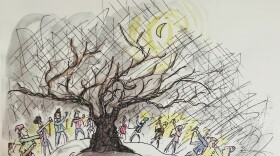
The Local Food Report
The Local Food Report takes us to the heart of the local food movement to talk with growers, harvesters, processors, cooks, policymakers and visionaries. The world of food is changing, fast. As people reimagine their relationships to food, creator Elspeth Hay and editor Viki Merrick aim to rebuild our cultural stores of culinary knowledge — and to reconnect us with the people, places, and ideas that feed us. Tips from listeners are always welcome.
The Local Food Report airs Thursday at 8:35 AM and 5:45 PM and Saturday at 9:35 AM and is made possible by our Local Food Report sponsors.
Latest Stories
-
For decades now, we’ve been hearing about the broken nature of our New England seafood industry fisherman Brett Tolley of Harwich explains.
-
Bitternut hickory trees were one of the most important perennial staple food crops in the eastern U.S. for eight thousand years or more.
-
Starting in about 2010, many towns on the Cape began trying to increase shellfish populations and credit them for their nitrogen-removal work.
-
The return of a bee that’s co-evolved with American chestnut trees.
-
Wassailing has a long and storied history that dates back hundreds of years in the UK.
-
It’s that time of year again—we’re deep into storage vegetable season and I’m looking for recipe inspiration.
-
Imagine yourself sitting down to dessert at the end of a holiday feast. What are you looking for in a pie? This is the question a panel of judges in Provincetown asks themselves each year at an event at the Provincetown Commons called Pie Fest.
-
This week, Elspeth gets the holiday scoop from a local ice cream maker.
-
Fermented non-alcoholic drinks are incredibly beneficial for our gut microbiomes, and these in turn boost everything from immune function to metabolic health and even mental health.
-
Lesley Marchessault of Provincetown has gotten serious about her biscuit recipes.











